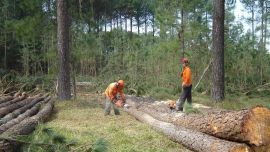Several thousand pro-government demonstrators marched in Buenos Aires on Tuesday to demand a reform of the judicial system and sweeping changes in the Supreme Court, as Frente de Todos ramped up its pressure on the Judiciary.
The march, led by Kirchnerite groups from the ruling coalition and supported by the government of Alberto Fernández, human rights organisations and trade unions, denounced the alleged bias of the Judiciary to the benefit of the opposition and against, mainly, Vice-President Cristina Fernández de Kirchner, who faces several corruption cases against her dating back to her two terms as president (2007-2015).
Federal Judge Juan Ramos Padilla, one of the organisers of the rally, which took place in front of the Palacio de los Tribunales in Buenos Aires, argued that "the people need equal justice” in an address.
“The Supreme Court should resign, to start building a Judiciary that serves us all,” he declared in his speech.
Protesters also demanded that judges investigate recent allegations of state espionage against political leaders and trade unionists, a plot prosecutors allege was organised by the government of the centre-right former president Mauricio Macri (2015-2019).
Oscar Medina, a state bank employee, told AFP that he took part in Tuesday’s march because "a Supreme Court is the highest court in a country and it should judge for the entire population, not belong to powerful groups."
A few days earlier, the opposition Juntos por el Cambio coalition coalition, of which Macri is a leader, described the march as a "coup” against the republic.
"They have tried to justify the corruption cases by attributing them to a non-existent and crude ‘lawfare’," a term that Kirchnerites have used to denounce graft cases against ex-public officials, the centre-right alliance said in a statement.
‘Aristocracy’
President Fernández has been pushing for judicial reform and wants to prevent "decision-making power from being concentrated in a small number of judges who have the power to hear and decide on almost all cases with institutional relevance," he told Congress in 2020.
The reform package, which Congress will continue to debate this year, includes the creation of new courts to redistribute cases and reduce the influence of the 12 federal tribunals that investigate the most politically sensitive cases. It also calls for the creation of a ‘Tribunal de Garantías’ (“Court of Guarantees”) that would limit the Supreme Court to constitutional issues.
For the opposition, this is an attempt to create a justice system more favourable to the ruling coalition, especially in terms of the cases involving Fernández de Kirchner, which sooner or later will reach the nation’s highest tribunal.
For the vice-president, Argentina's judicial officials "seem to constitute an aristocracy," as she recently to a judge prosecuting her.
Last week, speaking in Honduras, Fernández de Kirchner stated that "in the same way that military coups were financed” in the past, “judicial coups are beginning to be financed in Latin America.”
Argentina’s Judiciary validated all the coups d'état in the country during the 20th century, though since 1984 it has tried and convicted the leaders of the brutal last civic-military dictatorship (1976-1983) for crimes related to the disappearance of an alleged 30,000 people.
Trials for human rights violations continued in lower courts, albeit extremely slowly, according to humanitarian NGOs that track cases.
Political interest
Legal expert Ricardo Gil Lavedra, one of the judges who convicted members of the 1976-1983 junta, told AFP that Argentina’s Judiciary, "after the return to democracy [in 1983], came to occupy a central place in the political arena."
In the following decade, the Supreme Court supported the neoliberal economic reforms of Peronist president Carlos Menem (1989-1999), with rulings favourable to his government, which was the target of multiple corruption allegations.
"This new protagonism awakened political interest in how it could be co-opted and made friendlier. This began to happen in the 1990s, with the incorporation of new judges in the [Supreme] Court, which was sympathetic to power, and when attention was paid to the federal courts that have the majority of cases against public officials,” said Gil Lavedra. “That is its genesis.”
Between 2002 and 2005, seven judges have left the court, with some resigning on issues that brought the court into disrepute. In 2003, then-president Néstor Kirchner (2003-2007) introduced an unprecedented process of public hearings to select judges based on their academic, professional and tax records.
In 2015, Macri pushed through the appointment of two new judges to the Supreme Court, which must rule on three of the nine cases brought against Fernández de Kirchner for alleged corruption and in which she had been acquitted by lower courts.
























Comments